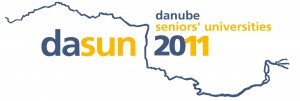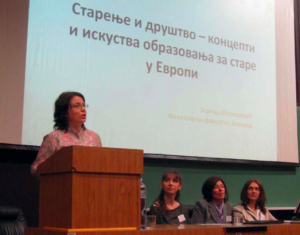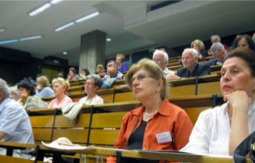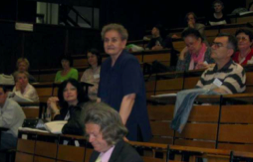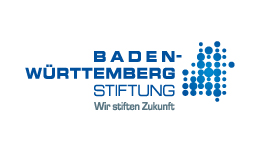Natalija Milosevic, University of Belgrade
In the project “Danube Seniors’ Universities” (DASUN), which is funded from December 2010 to July 2011 by the Baden-Württemberg Foundation and the Heidehof Foundation, possibilities for science-founded education for older adults were analysed at the universities of Belgrade, Serbia, Craiova, Romania, Sofia and Rousse, Bulgaria in close cooperation with cultural and educational institutions. After the analysis, educational offers for seniors were developed and tested in each of the partner organisation. The “academy weeks” of ZAWiW, the co-ordinator and scientific lead of the project, served as a model. Each university determined the needs and interests of the seniors with the help of a questionnaire and developed a concept for an education day for seniors at their university. These seniors’ education days were held in May- June 2011.
Serbian team consisted of University of Belgrade – Faculty of Philosophy, as a university part- ner, and National Foundation for Human Aging Dr. Laza Lazarevic and University of the Third Age, as NGO partners.
In Serbia, situation looks like this: there are some institutions dealing with seniors. Most of them are homes for the elderly or they are related to health care. But the University of the Third Age is concerned about their mental condition and offers different non-formal educa- tional programs like foreign languages, computer literacy, Yoga and Tai Chi, dance classes and art workshops of patchwork. Therefore, DASUN project offered very interesting new form of education for seniors – university-based academic education, which has not been established in Serbia so far.
Preparation
We were interested in our seniors’ attitude when it comes to these type of programs and the most important results of the initial questioning are:
84.5% of the 85 respondents would like to participate in programs of continuing education; Regarding subject areas of educational programs, most of them are interested in foreign lan- guage, PC and Internet. On the “second place” are cultural themes and health;
Regarding the goals that the respondents connect with continuing education, 48.2% of them chose “I want to deepen my knowledge”, 40% of them want to stay mentally fit, 24.7% want to get together with people with similar interests and 23.5% of them want to understand things better.
Academic Day
The main event of the project was so called the Academic Day, held on Saturday, 11.06.2011. in the Faculty of Philosophy, in Belgrade, Serbia, in which the academic educational contents were presented to the participants. They were invited by the National.
Foundation for Human Aging Dr. Laza Lazarevic and the University of the Third Age to partici- pate in this event and to bring up their impressions as well as ideas for the improvement and for the next Academic Day. The concept of this Day included lectures about experiences in education in the third age and the psychology of adulthood and aging, and also four workshops of the four departments from the Faculty of Philosophy: Ethnology and Anthropology, Art His- tory, Archaeology and History.
Outcomes
The participants’ impressions speak for themselves: 38.5% of the 52 participants liked this event, 59.6% said that it was very interesting and inspiring for them, and 1.9% of participants chose the answer “Other” and gave also positive comment: “I didn’t expect this day to be so interesting”. This refers to the Academic Day in general.
The participants’ proposals for the next Academic Day and actions in this field, which inter- ested us very much, were: to organize the Academic Day more often; to organize it as Aca- demic Days/Week, not only as a one-day event; to organize workshops at different times, so that participants can attend not only one of them, but more if they are interested; to inform people about the project – especially through the media and associations/ organizations of pensioners; to expand the Academic Day to other faculties of the University of Belgrade and its scientific fields.
Problems to resolve
The main problem and barrier of participation of the potential students is financing these pro- grams. Seniors in Serbia cannot afford to participate in educational programs because they have small pensions, have to pay medical treatment and medicines and often help their chil- dren who are possibly unemployed or have small salary. Therefore, we have to devise a special strategy to find sponsors, so that this idea can begin to live in Serbia and satisfy the hunger for knowledge and companionship of our old people.
Experience is our friend this time, but the irrefutable fact is that the elderly in Serbia want to be heard, that they want to have a part of the educational system as their own spiritus movens, so they can satisfy their educational and social needs.
